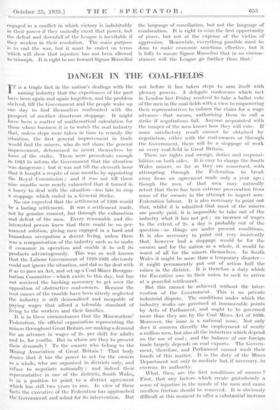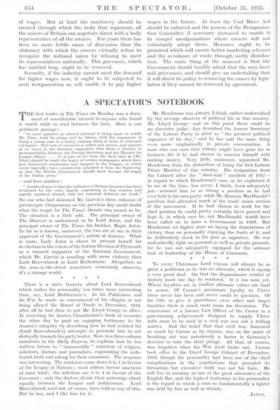DANGER IN THE COAL-FIELDS
IT is a tragic fact in the nation's dealings with the mining industry that the experiences of the past have been again and again forgotten, and the problem shelved, till the Government and the people wake up one day to find themselves confronted with the prospect of another disastrous stoppage. It might have been a matter of mathematical calculation for those whose business it is to watch the coal industry that, unless steps were taken in time to remedy the -situation, the first general improvement in trade would find the miners, who do not share the general improvement, determined to assert themselves by force of the strike. There were precedents enough in 1925 to inform the. Government that the situation "Was dangerous ; but it was not till the eleventh hour that it bought a respite of nine months by appointing the Royal Commission ; and it was not till those nine months were nearly exhausted that it turned in a hurry to deal with the situation—too late to stop a' stoppage which ended in a General Strike.
No one expected that the settlement of 1926 would be a lasting settlement. It was a settlement made, not by genuine consent, but through the exhaustion and defeat of the -men. Every reasonable and dis- interested person knew that there could be no per- manent solution, giving men engaged in a hard and hazardous occupation a decent living, unless there Was a reorganisation of the industry such as to make it economic in operation and enable pit to sell its products advantageously. This was so well known that the Labour Government of 1929-1981 obviously could not ignore the situation, and did so far deal with it as to pass an Act, and set up a Coal Mines Reorgan- isation Committee—which exists to this day, but has not received the backing necessary to get over the opposition of obstructive coabowners. Because the root causes of the trouble have been utterly neglected the industry is still demoralised and incapable of paying wages that afford a tolerable standard of living to the workers and their families.
It is in these circumstances that the Mineworkers' Federation, the official organisation representing the miners throughout Great Britain, are making a demand for an advance in wages of 2s. per shift for adults and Is. for youths. But to whom are they to present their demands ? To the owners who belong to the 'Mining Association of Great Britain ? That body denies that it has the power to act for the owners as' a whole, who are organised in, districts only, and refuse to negotiate nationally ; and indeed their representative in one of the districts, South Wales, is in a position to point to a district agreement Which has still two years to run. In view of these facts the executive of the Federation has approached the Government and asked for its intervention. But
not before it has taken steps to arm itself with plenary powers. A delegate conference which met in London last Friday resolved to take a ballot vote of the men in the coal-fields with a view to empowering their representatives to enforce the claim for a wage advance—that means, authorising them to call a strike if negotiations fail. Anyone acquainted with the temper of the men knows how they will vote. If some satisfactory result cannot be obtained by negotiation, either with the coal-owners or through the Government, there will be a stoppage of work on every coal-field in Great Britain.
There are rights and wrongs, duties and responsi- bilities on both sides. It is easy to charge the South Wales miners, so far as they are concerned, with attempting through the Federation to break away from an agreement made only a year ago ; though the men of that area may naturally retort that there has been extreme provocation from some of the owners in the attempt to import non- Federation labour. It is also necessary to point out that, whilst it is admitted that most of the miners are poorly paid, it is impossible to take out of the industry what it has not got ; an increase of wages to the extent of 2s. a day is probably out of the question—as things are under present conditions. It is also necessary to point out very insistently that, however bad a stoppage would be for the owners and for the nation as a whole, it .would be worst of all for the miners themselves. In South Wales it might be more than a temporary disaster— it might permanently put out of action half the mines in the district. It is therefore a duty which the Executive owe to their union to seek to arrive at a peaceful settlement. . But this cannot be achieved without the inter- vention of the Government. This is no private industrial dispute. The conditions under which the industry works are governed at innumerable points by Acts of Parliament, and ought 'to be governed more than they are by the Coal Mines Act of 1980. Moreover, the issue is a national issue. Not only does it concern directly the employment of nearly a million men, but also all the industries which depend on the use of coal ; and the balance of our foreign trade largely depends on coal exports. The Govern- ment, therefore, and Parliament cannot wash their hands of this matter. It is the duty of the Mines Department not only to mediate but, if necessary, to exercise its authority.
What, then, are the first conditions of success ? First, that any factors which create gratuitously a sense of injustice in the minds of the men and cause needless friction should be removed. It is obviously difficult at this moment to offer a substantial increase of wages. But at least the machinery should be created through which the body that represents all the miners of Britain can negotiate direct with a body representative of all the owners. For years there has been no more fertile cause of dissension than the obduracy' with which the owners virtually refuse to recognise the national union by refusing to meet its representatives nationally. This grievance, which has rankled long, ought to be removed.
Secondly, if the industry cannot meet the demand for higher wages now, it ought to be subjected to such reorganisation as will enable it to pay higher wages in the future. At least the Coal Mines Act .should be enforced and the powers of the Reorganisa- tion Cominittee if necessary increased to enable it to compel amalgamations where owners will not voluntarily adopt them. Measures ought to be promised which will ensure better marketing schemes and the avoidance of waste through costly distribu- tion. The main thing at the moment is that the Government should frankly admit that the men haVe real grievanCes, sand should give an undertaking that it will direct its policy to removing the causeS bY legis- lation if they cannot be removed by agreement.



























































 Previous page
Previous page